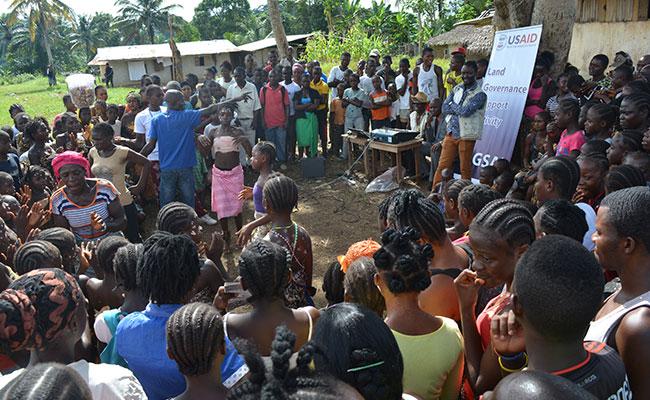Tetra Tech Helps Strengthen the Liberian Land Authority to Promote Peace and Security
Improving the capacity of critical land management institutions in Liberia

Innovations in Development: Solutions for a better future
David Felson, an associate focused on land tenure and property rights with Tetra Tech International Development Services, reflects on the role of land resources management in Liberia and how secure property rights can promote stability, following decades of conflict.
This August marks the 14th anniversary of the Accra Peace Agreement, which ended Liberia’s civil war. The conflict—in which 200,000 people were killed and more than one million were displaced—often pitted urban elites against indigenous communities and led to widespread displacement of people from their traditional lands.
Despite a lasting peace taking hold, last year the Civil Society Organizations (CSO) Working Group on Land Rights in Liberia reported that Liberia's “inability to pass a long-awaited law recognizing the rights of rural communities to their ancestral lands could plunge the West African nation back into civil war.” The report also stated that “Failure to recognize the rights of millions of Liberians to their customary lands jeopardizes peace and security, and could fuel a slide back into the conflicts that devastated our country for decades."
And Liberia’s case is not unique. From Sri Lanka to Ethiopia, competition over scarce resources drives violent conflicts around the world. Moreover, these conflicts are likely to intensify when property rights are insecure.
In Liberia, disparate government agencies managed land issues. One agency was responsible for storing land records, while another might conduct surveying and mapping. These silos were exacerbated by poor communication across agencies.
Last year, however, the Liberian Land Authority was established to consolidate the agencies, develop land policy, and implement programs in support of land governance. A functioning land governance institution and significant improvements to the land governance processes will enable Liberia to implement its land policy and the land administration to function effectively—halting the deterioration of land resources management. The Land Authority will expand access to important services like recording rights for rural customary groups, public information campaigns, and facilitating dispute resolution for overlapping claims.
Tetra Tech is on the ground in Liberia, implementing the U.S. Agency for International Development’s (USAID) Land Governance Support Activity (LGSA), which provides assistance to the Government of Liberia as it builds the capacity of local and national land management institutions and strengthens the political, legal, and regulatory frameworks for land governance.
LGSA is working to support the Land Authority by improving the human and institutional capacity for land governance in Liberia, which in turn will reduce tenure insecurity. Working with its Liberian counterparts, Tetra Tech is supporting the LGSA project in drafting a transition plan for the transfer of functions and personnel to the Land Authority, designing an organizational chart with staffing requirements for each department, and developing first-year and five-year action plans and associated budgets, among other activities.
The LGSA team also has been working with local communities throughout the country to prepare them for gaining legal ownership of their land. For example, in Kpatawee community, home to the popular Kpatawee Waterfalls tourist destination, the LGSA team has worked with local communities and members of the two clans around the waterfalls to inform them of the process of securing community land rights and facilitate the community self-identification process.
After more than 20 meetings, involving nearly 1,500 community members, the community units signed a self-identification resolution late last year. Prior to these meetings, boundary disputes between the two clans resulted in neither clan benefitting from tourism, though both clans maintained and protected their respective areas.
“Some Liberians used the civil war as a medium to get at other clans and even family members with whom they had a land dispute—even my own father was nearly killed over a family land dispute in the war,” said David Fehkpolo of the Ka Paa Kwa Geh Development Association, a LGSA partner organization working in Kpatawee community. “[The lack of codified community land rights] exacerbated and prolonged the war because people would take land during the chaos…. Even today, who owns the land has not been decided.”
Today, the project is helping members of the Kpatawee community realize the benefits of tourism, thanks to a new eco-tourism project around the waterfalls, which has been generating a monthly income of $13,000 Liberian dollars for villagers, according to a recent report.
“Now that we resolved the boundary dispute and established a leadership structure [between the two clans], we have an increased dialogue and can work together to profit from the waterfalls and future development projects,” added Fehkpolo. “This is thanks to [LGSA].”
As the example in Kpatawee shows, the LGSA project is working to promote a more effective, accountable, and inclusive land governance structure for all Liberians. This in turn helps ensure stability and peace in a region that has historically been impacted by war, as a strong land governance system provides the foundation for inclusion and economic growth.

